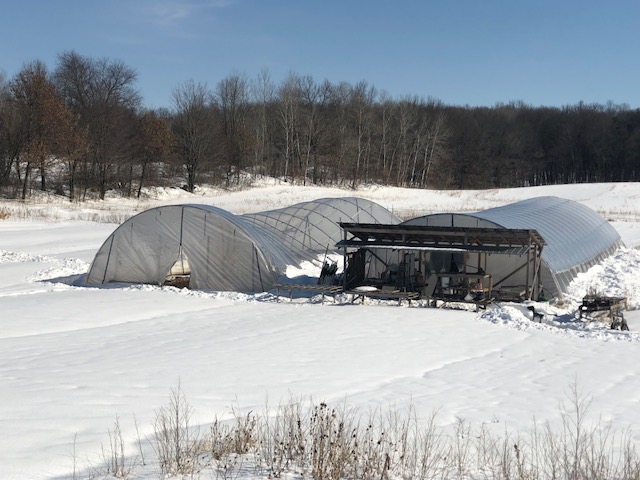Farming with Friend: The Panel

Rising Sand was invited to participate in an Earth Week panel discussion series on campus; fittingly, as 25% of our membership includes currently enrolled UWSP students. After kicking around a variety of potential topics in advance of the event, we landed on the novel idea of discussing Cooperative Farm creation. I rushed in a minute late, as the rest of the group settled uncomfortably into folding chairs at the front of the room. I quickly threw down my backpack and jacket, hopped into the last available seat, and faced the small crowd of students and community members awaiting our insight and perceived expertise.
“Umm, so we’re going to get started…” began Polly hesitantly, as Logan finished writing Rising Sand Organics on a whiteboard at his feet. Awkwardly and painfully, we bumbled into structureless introductions. “I’m Corrina. I’m twenty two… I’m a UWSP student, and uh…” We all continued in similar fashion: brief, menial and lifeless. Our group was as tense as I’ve ever seen us, resembling post-crisis press conference more than visionary entrepreneurial venture. The audience, thankfully, was excited and engaging, and we warmed up and settled in as questions started rolling and answers took shape between the seven of us.

About halfway through the panel, Dave Barbier, the University Sustainability Coordinator, raised his hand. “Let’s say we transport ourselves one year into the future. What will it look like if you guys have been successful?” There was a brief pause, and I jumped in with the first thought that entered my mind. “If we are here doing this next year, then we will have been successful.” As owners of a newly-collapsed hoop house; an operating budget weighted heavily in the direction of expenses; a massive FSA loan; and a chunk of land burdening under an unrelenting blanket of snow, we’ve got grounds for some anxiety. In spite of our broad and sweeping community and societal ambitions, existence, in and of itself, remains one of the great challenges and primary outputs of our operation. By continuing to operate as a cooperative farm over time, we will put ourselves in a position to share structure, language and resources with similarly-minded organizations, and prove the economic and social feasibility of the cooperative farming model. But all of that hinges on continued existence and success. As Danny W. so aptly and eloquently reminded our enthusiastic audience, “We haven’t actually done anything yet.”
What we have done, however, is establish a legal cooperative structure for our organization, and become notarized as a legitimate business with 11 owners. Polly continues to exercise verbal and literal precision on this point. A cooperative is not simply a group of people that work together, or even a group of employees in an organization who share decision-making power. Many organizations prioritize a sense of ownership among employees, for “staff buy-in” and the like. In a true cooperative, however, members share equal ownership over the entity, in every sense of the word. Busted hoop house, FSA loan, expansive expense budget: it all belongs to all of us, for better or worse. We 11 own this thing, legally and legitimately. The softer components of management and decision-making are critical areas of focus as well, and Polly’s answer to the success question addressed these aspects. “I’ll feel like we’ve been successful if next year everyone is more comfortable taking the reigns on new projects and making decisions more independently.”
And our bylaws legally dictate the necessity of cooperatively-made decisions. One member; one vote, no exceptions. For all of her verbal and literal precision, however, Polly fell prey to a hilarious slip of tongue while articulating our capital stock structure to the crowd. “So, in contrast to most other organizations, you can’t just buy more decision making powder.” It’s absolutely true, and as someone who’s bought plenty of decision-making powder, I can attest to the uniqueness of this model. Fiscal ownership and decision-making are legally disseminated equally between all member-owners, powder or no powder.
It was inspiring to engage with such an enthusiastic and interested group, and we continue to take every opportunity to educate on the tangible components of a Cooperative. Russ, my new boss and the owner of Mission Coffee, is a salesman to his core, and I overheard him selling a customer on his new hire. “Yeah, Lee is our staff dietitian! He graduated from UWSP, and is actually a share-holder in Rising Sand Organics, the new organic vegetable farm in the area…” I approached him after the conversation. “Member-Owner, Russ. I am not a share-holder; I am a Member-Owner of Rising Sand Organics.” With any bit of luck and fortune, next year at this time, I will still be a Member-Owner of Rising Sand Organics.
